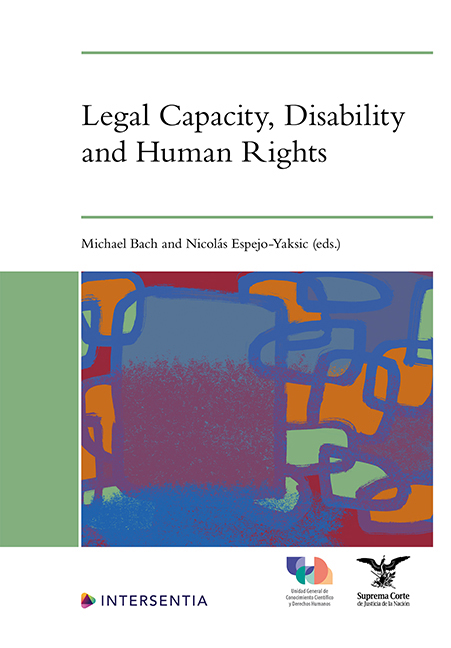Book contents
- Frontmatter
- Foreword
- Acknowledgements
- Contents
- List of Cases
- List of Contributors
- Legal Capacity, Disability and Human Rights: Introduction
- PART I HISTORICAL PERSPECTIVES AND THEORETICAL FRAMES
- PART II LAW REFORM: COUNTRY AND REGIONAL PERSPECTIVES
- PART III LEGAL QUESTIONS, PERSISTENT CHALLENGES
- Index
- About the Editors
Respect for the Will of the Person
Published online by Cambridge University Press: 03 April 2024
- Frontmatter
- Foreword
- Acknowledgements
- Contents
- List of Cases
- List of Contributors
- Legal Capacity, Disability and Human Rights: Introduction
- PART I HISTORICAL PERSPECTIVES AND THEORETICAL FRAMES
- PART II LAW REFORM: COUNTRY AND REGIONAL PERSPECTIVES
- PART III LEGAL QUESTIONS, PERSISTENT CHALLENGES
- Index
- About the Editors
Summary
The concept of will plays a role in CRPD Article 12 in two different ways: one explicit and one implicit. The concept makes its explicit appearance in the provisions of Article 12 that address the need for safeguards. Specifically, CPRD Article 12(4) requires states parties to ensure that “measures relating to the exercise of legal capacity respect the rights, will and preferences of the person” (emphasis added). But already in this formulation we can detect the second, implicit reliance on the concept of the will. For this call to respect the will of persons with disabilities pertains specifically to measures concerning the exercise of legal capacity. As we shall find in detail below, the very idea of legal capacity itself implicates the concept of the will, as well as a broader legal doctrine of the will and practices of ascription and attestation in which that concept is embedded. In contemplating the next steps in the ongoing struggle for disability rights (and in understanding some recent setbacks in that struggle), we therefore need to come to terms with the concept of the will – not least because the legal doctrine of the will has long functioned to exclude persons with disabilities from full participation in society and full enjoyment of their rights.
My plan is as follows. I begin in Section 1 with some ancient history, examining one of the oldest recorded law reforms in Europe, together with an episode from the history of its interpretation in early modern times. In these episodes from the history of law reform we can trace the social and legal architecture of an ancient regime of legal capacity in which the concept of the will came to occupy a crucial place. I then turn in Section 2 to contemporary law in Europe and Latin America, analysing modern civil codes in order to show that and how the concept of will plays a role as a legally primitive notion. In Section 3, I consider ways in which the legal doctrine of the will structures and constrains practices of will-ascription, will-attestation and will-nullification in ways that exclude persons with significant cognitive and psychosocial disabilities from full enjoyment of legal capacity.
- Type
- Chapter
- Information
- Legal Capacity, Disability and Human Rights , pp. 31 - 48Publisher: IntersentiaPrint publication year: 2023



